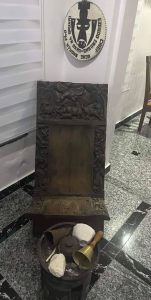A king without domain is not a true king. The title of ‘Eze Ndigbo’ or by whatever name they are called, operating outside Igboland is an aberration. Igbo traditional rulers are only obtainable in Igboland, and operate in their respective communities.
For administrative and related purposes, most Igbo communities have vibrant town unions and sometimes village associations in the various towns where Ndigbo reside in the diaspora. The Presidents or Chairmen of such groups are the ‘Onye Ndus’ or leaders of their people. They have always been the points of contact between the governments of the host communities and the Igbo settlers, and should remain so.

To be crowned a king, a community should be in agreement and collectively make one a king. Those answering Eze Ndigbo outside Igbo communities are self appointed or self -crowned. They do these purely for mercantile purposes milking the supposed benefits that come with the falsehood such as receiving ‘ego oji’, and other homage items at events. Such practice confuses the people and bastardizes the Igbo culture.
If one is a title holder in his community in Igboland, he may decide to also take along some of his traditional beliefs and cultural practices to the town where he sojourns outside Igboland. However, the person should be mindful not to begin to pass himself off by any means as an ‘Eze something’. He may break kola-nuts in his house or when he is invited to events but only as a titled man in Igboland, not as an ‘Eze Something’. Carrying oneself in such manner dishonours the person’s community’s traditional ruler and also tarnishes the revered image of Igbo traditional institutions.
Those who pass themselves off as ‘Eze Ndigbo’ in the diaspora have been known to fuel conflicts with their elected or appointed community traditional rulers whenever they return to Igboland. They begin to fight for relevance and recognition with the people, thus diminishing the traditional respect that should be accorded the authentic Igwe or Eze of the community. This is wrong.
Traditional rulers of South East Nigeria have canvassed at various fora that such self-acclaimed ‘Eze Ndigbo’ titles in the diaspora should not be recognized at all by Ndigbo and their respective host communities. I support this view for we can not have two captains in one ship because, ‘Onye Fee Eze, Ichie Elu Ya’.
Also, it takes a lot for one to be a King. Certain codes of conduct guide traditional rulers. This is to help maintain social cohesion and order. Traditional rulers are not known to be flippant. They should always maintain the strictest decorum and decency so as not to disgrace the traditional institution or bring shame to their communities and people. It is expected that traditional rulers conduct themselves always in ways that does not promote social friction. This is the reason why most states in Nigeria have Ministries of local government and Chieftaincy matters. They have a council of traditional rulers and as the 4th tier of government help in promoting developmental policies in their respective domains.
Authentic traditional rulers know that there are sanctions if they misbehave. Many have been suspended from office, or have their traditional stools taken away from them for deviant behaviours. We can not say that those self-appointed ‘Eze Ndigbo’ in the diaspora operate under any code or are accountable to anybody. This may be perhaps why some of them talk ‘anyhow’, as we have in the trending case of a supposed ‘Eze Ndigbo’ somewhere in Lagos, whose reckless comments are capable of causing friction between Ndigbo living in Lagos, the Lagos state government, and the host communities.
Uche Nworah, Ph.D
